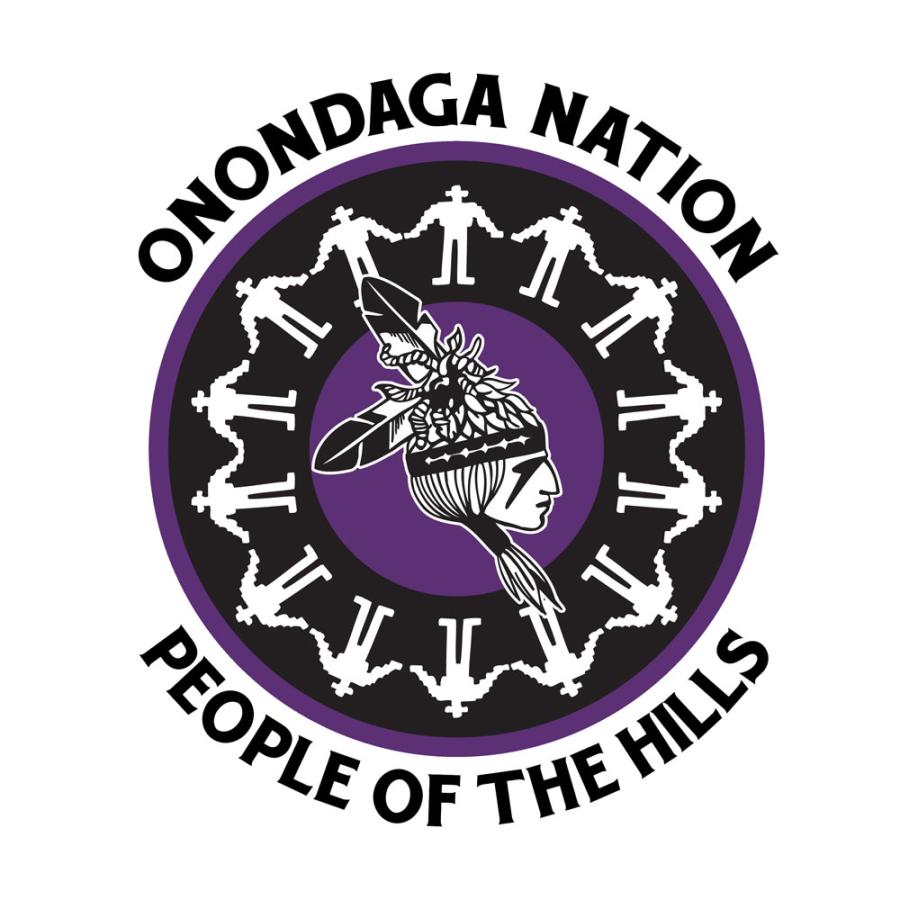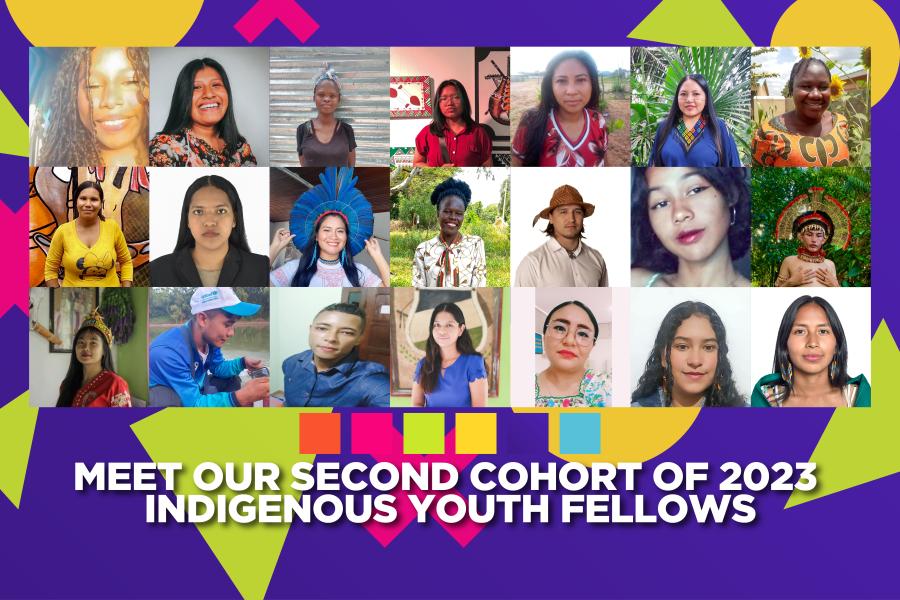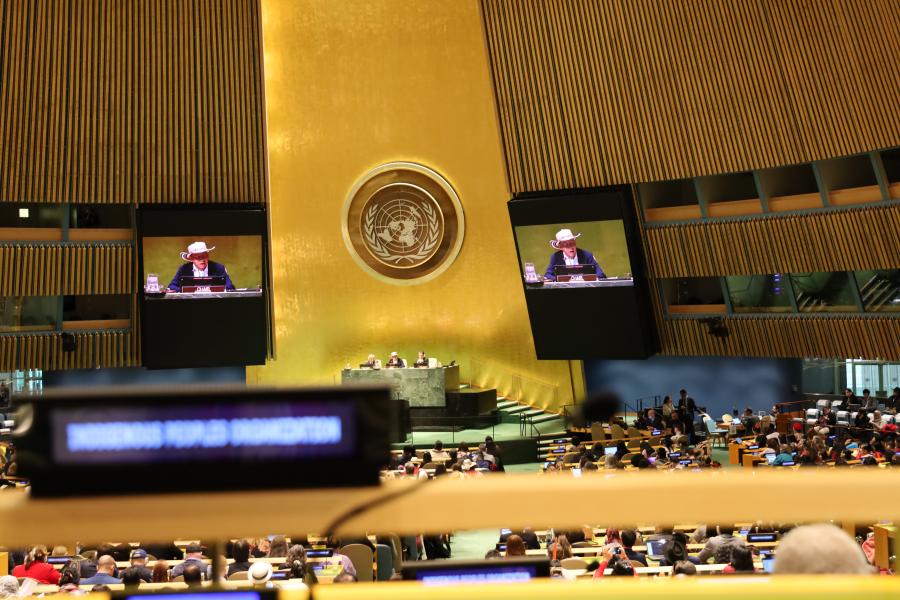
Dear COP28 Delegates,
We, Indigenous leaders and allies from diverse cultures, traditions, and regions across the globe, are united in calling for COP28 to be a platform to discuss Indigenous Peoples’ rights in the context of the increasing demand for minerals mined for energy storage, electrified transportation batteries, and other green energy technologies. In our call, we urge for governments and corporations to respect, protect, and fulfill Indigenous Peoples’ rights, specifically the right to Free, Prior and Informed Consent (FPIC), as the minimum standards enumerated in the United Nations Declaration on the Rights of Indigenous Peoples (UNDRIP) and the ILO Convention 169, to ensure equitable and responsible environmental and social practices on our lands.
We acknowledge and emphasize that it is more important than ever to transition to clean energy and clean transportation solutions, and away from fossil fuels such as oil, coal, and gas. Indigenous leaders have been calling for climate action around the world for decades. We have ancestral, cultural, and spiritual ties to our lands that not only require our participation in climate advocacy but also call us to commit to the proper stewardship practices of nature that are deeply rooted in our ways of life. Many Indigenous leaders are pursuing and championing clean energy and transportation solutions on their territories that align with their self-determined needs and goals. These Indigenous-led solutions need to be acknowledged, recognised, promoted, and funded by States and private entities.
While we are at the forefront of the fight for climate action and clean energy, our profound connection to our ancestral lands also puts us on the frontlines to ensure that these lands will not be sacrifice zones for those companies and politicians who seek a quick fix in the name of climate solutions. Our commitment to a just transition doesn’t overshadow our firm stance against mining practices that occur without obtaining FPIC of Indigenous Peoples and can lead to displacement; migration; and livelihood, cultural, and language loss. We firmly assert that mining operations must adhere to responsible practices guided by the FPIC framework, which upholds the right to self-determination of Indigenous Peoples. We, Indigenous Peoples, hold an inherent and inalienable right to make decisions about the future of our lands, territories, and resources.
The historic exploitation of our people and lands by oil, gas, and mining companies showcases a legacy of putting profits over our well-being, health, safety, cultures, traditions, and our sacred lands, waters, and air. With 54% of energy transition minerals globally located on or near our Indigenous Peoples’ lands, it is imperative that our communities participate meaningfully in decision-making and are able to exercise our right to give or withhold consent to these projects that will impact our lives, livelihoods, and cultures.
Ignoring our voices will only perpetuate the fossil fuel and mining industry’s status quo. Instead, if and when new mines are proposed on our ancestral lands, Indigenous Peoples must be involved from the start. Our subsistence, cultural practices, and priorities must be at the center of negotiations for proposed mines on our lands. We need to be involved in policies and enhanced levels of engagement and transparency at every step of the process. These must be co-developed with our participation and according to our leadership and governance structures.
The most protective way to achieve this is for governments and businesses around the world to ensure the highest standards of FPIC occur for every proposed minerals mining project that impacts Indigenous Peoples. As articulated in the UN Declaration on the Rights of Indigenous Peoples, which was adopted by the United Nations in 2007 and endorsed by many countries throughout the world, FPIC expresses consent-based protocols defined by Indigenous leaders, secures decision-making authority and participatory rights in all decisions that affect Indigenous communities and territories, and helps understand the full impacts of projects affecting Indigenous Peoples lands, subsistence, and cultural practices, and ways of life.
FPIC encompasses Indigenous Peoples’ right to:
-
Enter into conversations and negotiations without coercion or manipulation.
-
Engage in consultations and decision-making processes long before decisions are made concerning their land, resources, individuals, and communities.
-
Utilize their own traditional decision-making structures/governance, ensuring that these structures are respected and integrated into the process.
-
Have full information that is easily accessible and readily available in a language they understand.
-
Say “yes” or “no” to a project.
-
To be involved and heard throughout a project’s life cycle wherever it impacts people and resources.
-
Retain the ability to withdraw consent at any stage of the project or activity if circumstances change or new information arises that affects their consent.
-
Receive support and resources necessary for effective and meaningful participation in discussions and decision-making processes.
We will not back down from our role as leaders in the fight for climate action and clean energy. COP28 must be the foundation for governments around the world to build on this momentum and take the urgent steps needed to secure Indigenous Peoples’ self-determination as reflected in UNDRIP and as defined by impacted Indigenous Peoples so that the world can get this transition right, take the required climate action, and avoid making the mistakes of the past that have put our people and ways of life at risk, and have pushed planetary boundaries to dangerous limits. In the spirit of this effort, we believe it is an opportunity to define a better and more inclusive world that serves all communities and all peoples – transcending the boundaries of concentrated political and economic power. In this collective vision, we are committed to protecting our shared cultural heritage and practices that bind us together and to continue being responsible stewards of the planet.
Thank you for your time and consideration.
Signed,
Organizational sign-ons:
Securing Indigenous Peoples’ Rights in the Green Economy (SIRGE) Coalition
Cultural Survival
First Peoples Worldwide
Batani Foundation
Earthworks
Society for Threatened Peoples
Alaska Community Action on Toxics
Arctic Šuorbmu
Aroroy Youth Environmental Guardian-PH
Asia Indigenous Peoples Network on Extractive Industries and Energy (AIPNEE)
Asociación Estoreña Para el Desarrollo Integral (AEPDI)
Association pour l'Integration et le Developpement Durable au Burundi, AIDB (Indigenous Forum under the UN ECOSOC status since 2012)
Bamboo Forum of Tripura
Black Hills Clean Water Alliance
Center for Indigenous Peoples' Research and Development (CIPRED)
Center for Transnational Environmental Accountability
Centre for Environment, Human Rights & Development Forum (CEHRDF)
Centre for Support of Indigenous Peoples of the North
Chimpu Warmi
Communication Association for Rural Women in Development
Community Empowerment and Social Justice Network (CEMSOJ)
Community Environmental Network
Consejo Internacional de Tratados Indios en Guatemala
Continental Network Of Indigenous Women Of The Americas (ECMIA)
Development Pathways LtdGte
Earthjustice
European Union Raw Materials Coalition
European Environmental Bureau
Fair Mining Collaborative
Fundación Selva Sagrada
Grand Riverkeeper Labrador
Ilias Centre for Global Governance
Indigenous Peoples Global Forum for Sustainable Development, IPGFforSD (International Indigenous Platform)
Indigenous Peoples Rights International (IPRI)
Indigenous Russia
InsightShare
Institute for Sustainable Futures
Interfaith Power & Light
International Committee of Indigenous Peoples of Russia (ICIPR)
International Indian Treaty Council
International Work Group for Indigenous Affairs
Investor Advocates for Social Justice (IASJ)
London Mining Network
Malach Consulting
Maryknoll Office for Global Concerns
Missionary Oblates of Mary Immaculate
Natural Resource Governance Institute (NRGI)
New Mexico & El Paso Interfaith Power and Light
Northeast Biogas Initiative
Paropakar Primary Health Care Centre (PPUK)
Perempuan Aman (Association of Indigenous Women of The Archipelago)
Publish What You Pay
Sami Heritage and Development Foundation
Semilla Warunkwa
Sisters of Mercy of the Americas Justice Team
Sisters of Saint Francis Rochester Minnesota USA
Support for Women in Agriculture and Environment
Te Kotahitanga o Ngati Tuwharetoa
The Altai Project
The Friends of the Stikine Society
Tribal Link Foundation
UK Extractive Industries Transparency Initiative Multistakeholder Group
Union des Peuples autochtones pour le Reveil au Developpement
United Tribes of Bristol Bay
Universidad Mayor de San Andrés
Women & Life Foundation
ZERO – Association for the Sustainability of the Earth System
Interfaith Power & Light
Sisters of Saint Francis Rochester Minnesota USA
Community Action for Development (CAD)
Sunflower News
Center for World Indigenous Studies
Neighborhoodeconomics.org
Oxfam
Village Farmers Initiative (VFI)
TRIPPINZ CARE INC
PLEADING FOR THE WIDOWS FOUNDATION INTERNATIONAL
1000 SHADE OF WOMEN FOUNDATION INTERNATIONAL
Extended Arms Diamond Inc
Focus Association for Sustainable Development
AIPPA- Associação Indigena Pankararu -Pataxo
Comunidad Huarpe Guaytamari/ONPIA-Organizacion de Naciones y Pueblos Indigenas en Argentina
Denver Justice and Peace Committee
Center for Environmental Research and Agriculture Innovations (CERAI)
Global Witness
Individual sign-ons:
Ann Kristin Remmen Hektoen
María Isabel Flota Ayala
Vera Wenger
Nicola Peel
Allen Edzerza, Tahltan Elder
Benjamin Christie
Dona LaSchiava
Lynn Shoemaker
Arlene Zaucha
Lila Tabobondung, Elder
Regina Edmonds
Deborah Nam-Krane
Jim Head
Jane White
Martha Spencer
Carolyn Buckner



